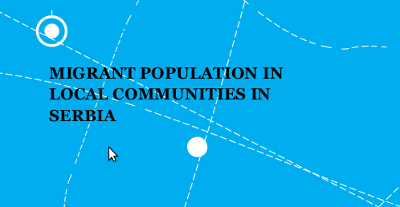Hotline: +381 61 63 84 071
Migrant population in local communities in Serbia

Publication Migrant population in local communities in Serbia is produced within the project Opening a dialogue in local communities between citizens and migrants on mutual tolerance and non-violence, which was realized from November 2013 to December 2014 by Citizens “ssociation for Combat against Trafficking in Human Beings and all Forms of Violence against Women Atina, in partnership with Asylum Protection Centre APC/CZA, and with the support of the European Union and the Office for Cooperation with Civil Society of the Government of the Republic of Serbia. The goal of the initiative was to develop effective models of response and reduce xenophobia and prejudice in local communities in Serbia. A goal formulated in such a way can also be understood in the light of creating an adequate mechanism for prevention of human trafficking and other forms of exploitation and violence which migrant population in Serbia is potentially exposed to. Project activities were focused on strengthening capacities of civil society organisations and professionals whose engagement is directed towards providing support to, and protection of, migrants. Empowering organisations, and migrants themselves, to develop and encourage a dialogue and exchange in local communities, which is the key aspect of the initiative, is viewed by Atina as a way to achieve their vision of life in the communities, characterised by understanding, respect, solidarity, full participation and care for all their members.
At the time this publication was created, trained cultural mediators - representatives of the migrant population - began their work, and we are hoping that this model of support for integration will continue to grow, and that it will spread beyond the five communities currently involved in the project - ”ogovađa Lajkovac , ”anja Koviljača (Loznica), Subotica, Sremska Mitrovica and Šid.
The publication itself represents the basis for consideration of all the elements of the initiative Opening a dialogue in local communities between citizens and migrants on mutual tolerance and non-violence . Each segment of the research - analysis of international standards and national legislative and strategic framework, the analysis of in-depth interviews with migrants and focus-group interviews with professionals from the communities involved in the project, as well as the identified challenges and recommendations - served to create a series of activities in which the migrants actively and devotedly participated.
For shared consideration of possible directions for improvement of the status of migrant population in Serbia, which has been transformed into this publication, we owe special thanks to: Aleksandra Nikolić, Jelena Leskovac, Rima Kilani, Radoš Đurović, Jovana Vinčić, Mirko Rudić and Branimir Milovanović.
With this publication we wish to remind you that dialogue, cooperation and understanding need to be the only desirable models of communication in all the communities in Serbia.












 FACEBOOK
FACEBOOK TWITTER
TWITTER YOUTUBE
YOUTUBE